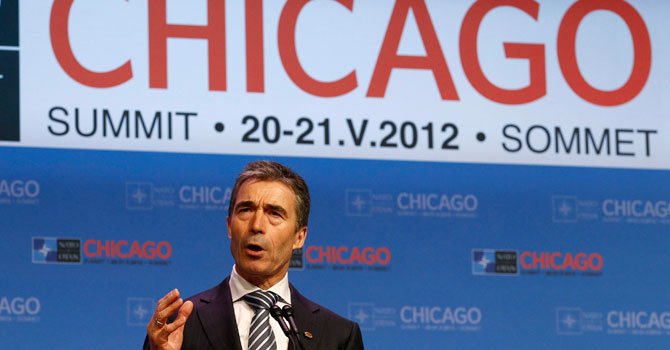
CHICAGO, May 21: Nato Secretary General Anders Fogh Rasmussen acknowledged on Monday that there could be no large drawdown of troops from Afghanistan without Pakistan’s help as both sides also expressed the desire to stay engaged with each other despite differences.
“We count on Pakistan’s commitment to support Isaf and Nato efforts in Afghanistan,” Mr Rasmussen told a briefing at the Nato summit in Chicago after a meeting with President Asif Ali Zardari.
In a related development, Pakistan’s Foreign Minister Hina Rabbani Khar and Ambassador Sherry Rehman met US Secretary of Defence Leon Panetta and National Security Adviser Tom Donilon for talks focused on reopening the supply routes.
“We feel that we are moving towards resolving this issue,” a US source told Dawn.
Earlier, President Zardari told a meeting of Isaf members and their supporters that he had come to the summit to “confirm our belief that a peaceful, prosperous and stable Afghanistan is in Pakistan’s national interest.”
Mr Rasmussen, while responding to a question, said no preconditions had been attached to the invitation Nato sent to Pakistan to attend the Chicago summit.
“We hope that Pakistan will reopen the land routes very soon, because we need these,” he said. “Without routes, our drawdown in large numbers will be difficult.”
But he rejected the suggestion that Nato wanted Pakistan to reopen the routes, closed after the Nov 26 Salala incident, before coming to the summit.
“There was never an expectation that Pakistan will reopen the supply routes before coming to summit,” he said. “We wanted to engage with Pakistan and discuss our efforts for the future of Afghanistan.”
Mr Rasmussen said he had met President Zardari before coming to the briefing and the Pakistani leader shared his views on this issue.
President Zardari also tackled this issue in his speech but did not say when Pakistan was going to reopen the routes closed more than six months ago.
He noted that recently the Pakistani parliament had given a roadmap for future engagement with Nato and Isaf.
“We are bound by the advice of our parliament and the democratic forces. Our parliament has spoken in favour of cooperation and a partnership approach,” he said.
The Defence Committee of the Cabinet also had considered the issue and directed relevant officials to conclude negotiations for resumption of the Ground Lines of Communication to Afghanistan.
“Such a venture is sustainable on the long-term basis only on the foundation of mutual respect for sovereignty and cooperative spirit,” he said.
Mr Zardari noted that the Pakistani parliament also had recommended that foreign fighters and non-state actors seeking to destabilise Afghanistan and the region, “if found on our soil, must be expelled.”
Pakistan, he said, was devising a comprehensive plan for this purpose, which would require the support of the international community both in terms of resources and capacity building.
“It will also require measures aimed at the economic well-being of the people of the areas affected by the military action,” he said.
The two statements – by Secretary General Rasmussen and President Zardari – ended wild speculations, encouraged initially by US media reports, that Pakistan was heading towards a head-on collision with the United States and its Nato allies on the Afghan issue.
The New York Times reported that US President Barack was so upset with Pakistan’s refusal to reopen the routes that he had refused to meet President Zardari.
The Americans, other reports speculated, had also advised the Nato secretary general not to meet the Pakistani leader.
But Monday’s proceedings at the summit conference began with a brief meeting between the US and Pakistanis presidents outside the conference.
Since it was not a proper meeting, the US media speculated that it was just a “chance encounter” and a “photo op” and not a meeting.
When President Zardari said that a Pakistani team negotiating the reopening of the supply routes with American experts in Islamabad had all the powers to take any decision on this issue, it was interpreted as Pakistan’s refusal to reopen the communication lines.
Even a joint Nato declaration affirming Pakistan’s role in the Afghan conflict was dismissed as a mere formality.
Although Pakistan was not the focus of this declaration, it clearly spelled out Nato’s position on its relations with Pakistan.
The Nato declaration noted that Pakistan had an important role in “ensuring enduring peace, stability and security in Afghanistan and in facilitating the completion of the transition process.”
It informed Pakistan that Nato would stand ready to continue dialogue and practical cooperation with relevant regional actors in this regard.
Although the declaration welcomed the progress on transit arrangements with Nato’s Central Asian partners and Russia, it emphasised the need to continue to work with Pakistan to reopen the ground lines of communication as soon as possible.












































Dear visitor, the comments section is undergoing an overhaul and will return soon.